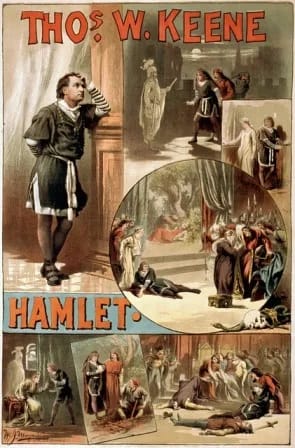William Shakespeare is one of the most renowned playwrights and poets in literary history. He wrote numerous plays, sonnets, and narrative poems during the late 16th and early 17th centuries. Below are some of his classic plays written by him
1. Romeo and Juliet: A tragic love story of two young lovers from feuding families.
2. Hamlet: A tragedy about Prince Hamlet, who seeks revenge for his father’s murder.
3. Macbeth: A dark and bloody tragedy exploring the corrupting power of ambition.
4. Othello: The story of a Moorish general who falls victim to jealousy and manipulation.
5. A Midsummer Night’s Dream: A comedy featuring mischievous fairies, magical spells, and romantic entanglements.
6. Julius Caesar: A historical drama about the assassination of the Roman leader.
7. The Tempest: A play set on a remote island, blending elements of romance, revenge, and magic.
8. King Lear: A tragic tale of an aging king who makes a disastrous decision regarding his kingdom.
9. Much Ado About Nothing: A witty comedy that revolves around mistaken identities and romantic misunderstandings.
10. Twelfth Night: A comedic play of mistaken identities, love triangles, and humorous misadventures.
In addition to these plays, Shakespeare wrote 154 sonnets, which are 14-line poems exploring themes of love, beauty, and the passage of time. Some of his notable sonnets include Sonnet 18 (“Shall I compare thee to a summer’s day?”) and Sonnet 116 (“Let me not to the marriage of true minds”).
These are just a few examples of Shakespeare’s extensive body of work. His plays and poems continue to be celebrated and performed around the world, making him a literary icon.
plays by william Shakespeare
William Shakespeare wrote a total of 39 plays throughout his career. Here is a comprehensive list of his plays categorized by genre:
Tragedies:
1. Romeo and Juliet
2. Hamlet
3. Macbeth
4. Othello
5. King Lear
6. Julius Caesar
7. Antony and Cleopatra
8. Coriolanus
9. Timon of Athens
10. Titus Andronicus
Comedies:
1. A Midsummer Night’s Dream
2. Much Ado About Nothing
3. As You Like It
4. Twelfth Night
5. The Merchant of Venice
6. The Taming of the Shrew
7. The Comedy of Errors
8. Love’s Labour’s Lost
9. Measure for Measure
10. All’s Well That Ends Well
Histories:
1. Richard III
2. Henry IV, Part 1
3. Henry IV, Part 2
4. Henry V
5. Henry VI, Part 1
6. Henry VI, Part 2
7. Henry VI, Part 3
8. Richard II
9. Henry VIII
10. King John
Romances:
1. The Tempest
2. Pericles, Prince of Tyre
3. Cymbeline
4. The Winter’s Tale
5. The Two Noble Kinsmen
Additionally, Shakespeare collaborated with other playwrights on a few plays, including:
1. Timon of Athens (co-authored with Thomas Middleton)
2. Pericles, Prince of Tyre (co-authored with George Wilkins)
3. The Two Noble Kinsmen (co-authored with John Fletcher)
These plays cover a wide range of themes, styles, and characters, showcasing Shakespeare’s mastery of storytelling and language. Each play offers a unique theatrical experience and continues to be performed and studied worldwide.
Who is Shakespeare?
William Shakespeare is one of the most renowned playwrights and poets in literary history. He wrote numerous plays, sonnets, and narrative poems during the late 16th and early 17th centuries. Below are some of his classic plays written by him
How many sonnets did Shakespeare write?
Shakespeare’s collection of 154 sonnets is renowned for its lyrical beauty, emotional depth, and exploration of themes such as love, time, beauty, and mortality. While it’s not possible to include all of the sonnets here, I can provide a few examples to give you a taste of Shakespeare’s sonnet style:
When was William Shakespeare born?
Shakespeare was born in Stratford-upon-Avon, England, in April 1564. The exact date of his birth is unknown but traditionally celebrated on April 23. Co-incidentally He took his last breath on the same date in 1616, at the age of 52.
How many plays did Shakespeare write?
Shakespeare wrote a total of 39 plays, including tragedies, comedies, histories, and romances. Few of his most famous plays include “Hamlet, “Romeo and Juliet,” “Macbeth,” “Othello,” “A Midsummer Night’s Dream,”, “King Lear,” and “The Tempest.”
Where was Shakespeare born?
Shakespeare was born in Stratford-upon-Avon, England, in April 1564.
Who is the Shakespeare of India?
The term “Shakespeare of India” is often used to refer to Rabindranath Tagore, a renowned poet, playwright, and philosopher from Bengal, India. Tagore is considered one of the greatest literary figures in Indian history and is often compared to William Shakespeare for his profound impact on literature and his ability to capture the human experience.
When did Shakespeare die?
William Shakespeare is believed to have died on April 23, 1616.
shakespeare poems
William Shakespeare wrote a collection of 154 sonnets, which are 14-line poems written in iambic pentameter. The sonnets explore various themes such as love, beauty, time, and the complexities of human emotions. While they are not as well-known as his plays, Shakespeare’s sonnets are highly regarded for their poetic beauty and depth of expression. Here are a few notable sonnets:
Sonnet 18: “Shall I compare thee to a summer’s day?”
Sonnet 29: “When, in disgrace with fortune and men’s eyes”
Sonnet 73: “That time of year thou mayst in me behold”
Sonnet 116: “Let me not to the marriage of true minds”
Sonnet 130: “My mistress’ eyes are nothing like the sun”
Each sonnet is numbered and can be identified by its respective number. They are often studied and analyzed for their intricate use of language, imagery, and metaphors.
It’s worth noting that in addition to the sonnets, Shakespeare also wrote longer narrative poems, such as “Venus and Adonis” and “The Rape of Lucrece.” These narrative poems showcase Shakespeare’s poetic skill and storytelling ability outside the realm of drama.
Shakespeare’s poems, particularly his sonnets, continue to be admired and studied for their timeless themes and poetic excellence.
anne hathaway (wife of shakespeare)
Anne Hathaway was indeed the wife of William Shakespeare. She was born in 1556 in Shottery, a village near Stratford-upon-Avon, England. Anne Hathaway and William Shakespeare got married in 1582 when he was 18, and she was 26 years old. Their marriage was somewhat unusual for the time since Anne was several years older than Shakespeare.
Not much is known about Anne Hathaway’s life, as historical records are limited. It is believed that she came from a relatively affluent family. She and Shakespeare had three children together: a daughter named Susanna and twins named Hamnet and Judith.
Shakespeare’s relationship with Anne Hathaway has been a subject of speculation and curiosity over the years due to the scant information available. The circumstances surrounding their marriage, as well as Shakespeare’s departure from Stratford-upon-Avon to pursue his career in London, have led to various interpretations and theories.
Despite the limited information, it is widely believed that Anne Hathaway and William Shakespeare maintained a marriage throughout Shakespeare’s career. Shakespeare’s will, written in 1616, made provisions for Anne, leaving her his “second-best bed” along with other bequests. The exact significance of this bequest remains a matter of debate and interpretation.
Anne Hathaway outlived her husband by several years and passed away in 1623. She is buried beside William Shakespeare in the Holy Trinity Church in Stratford-upon-Avon.
shakespeare of india
The term “Shakespeare of India” is often used to refer to Rabindranath Tagore, a renowned poet, playwright, and philosopher from Bengal, India. Tagore is considered one of the greatest literary figures in Indian history and is often compared to William Shakespeare for his profound impact on literature and his ability to capture the human experience.
On May 7 1861, Tagore was born in the city of Calcutta now known as Kolkata. He wrote in Bengali and was the first non-European to win the Nobel Prize in Literature in 1913 for his collection of poems, Gitanjali (Song Offerings). Tagore’s works included poetry, short stories, novels, plays, and songs.
As a playwright, Tagore’s plays are highly regarded for their poetic beauty, philosophical depth, and exploration of human emotions. Some of his notable plays include “Chitra,” “The Post Office,” “The King of the Dark Chamber,” and “The Home and the World.” These plays often deal with themes such as love, spirituality, social issues, and the clash between tradition and modernity.
Tagore’s writings had a profound impact not only on Indian literature but also on the cultural and intellectual landscape of India. His works transcend boundaries and have been translated into numerous languages, earning him international recognition.
While there are other prominent playwrights and poets in India who have made significant contributions to Indian literature, Rabindranath Tagore is often referred to as the “Shakespeare of India” due to the immense influence and enduring legacy of his literary works.
william shakespeare information
William Shakespeare is considered to be one of the greatest playwrights and poets in the English language. Here is some information about him:
1. Birth and Death: Shakespeare was born in Stratford-upon-Avon, England, in April 1564. The exact date of his birth is unknown but traditionally celebrated on April 23. Co-incidentally He took his last breath on the same date in 1616, at the age of 52.
Visit HIS Birthplace at Stratford-upon-Avon, England
2. Early Life: Shakespeare was the third of eight children and was born into a middle-class family. His father, John Shakespeare, was a glove-maker and an alderman, while his mother, Mary Arden, came from a wealthy farming family.
3. Education: Shakespeare attended the local grammar school, where he received a classical education. However, there are no records of him attending university, leading to speculation about his formal education.
4. Marriage and Family: In 1582, at the age of 18, Shakespeare married Anne Hathaway, who was eight years older than him. The names of his children are: Susanna and twins Hamnet and Judith. Sadly, Hamnet died when she was just 11 years of age.
5. Career: Shakespeare’s career in the theater began in the late 1580s. He became a shareholder and actor in the Lord Chamberlain’s Men, later known as the King’s Men. Shakespeare’s plays were performed at the Globe Theatre and other theaters in London.
6. Plays: Shakespeare wrote a total of 39 plays, including tragedies, comedies, histories, and romances. Few of his most famous plays include “Hamlet, “Romeo and Juliet,” “Macbeth,” “Othello,” “A Midsummer Night’s Dream,”, “King Lear,” and “The Tempest.”
7. Sonnets: In addition to plays, Shakespeare also wrote 154 sonnets, which are lyrical poems expressing themes of love, beauty, and the passage of time. His sonnets are revered for their intricate language and emotional depth.
8. Legacy: Shakespeare’s works have had an enduring influence on literature, theater, and culture. His plays continue to be performed worldwide and are studied extensively in schools and universities. His use of language, complex characters, and exploration of universal themes make his works timeless.
9. Language and Style: Shakespeare’s writing style is known for its poetic language, rich imagery, and skillful use of iambic pentameter. He coined many new words and phrases, which have become a part of the English language.
10. Authorship Debate: There has been ongoing debate and speculation about the authorship of Shakespeare’s works. Some theories suggest that someone other than Shakespeare wrote the plays attributed to him. However, the overwhelming majority of scholars and experts believe that William Shakespeare of Stratford-upon-Avon is the true author of the plays and poems attributed to him.
While there are gaps and uncertainties in our knowledge about Shakespeare’s life, his contributions to literature and his impact on the world of theater are unquestionably profound.
shakespeare love quotes
William Shakespeare is well-known for his beautiful and timeless expressions of love in his plays and sonnets. Here are some famous love quotes from Shakespeare:
1. “Love looks not with the eyes, but with the mind, and therefore is winged Cupid painted blind.” – A Midsummer Night’s Dream
2. “Doubt thou the stars are fire, Doubt that the sun doth move, Doubt truth to be a liar, But never doubt I love.” – Hamlet
3. “My bounty is as boundless as the sea, my love as deep; the more I give to thee, the more I have, for both are infinite.” – Romeo and Juliet
4. “Love is not love which alters when it alteration finds.” – Sonnet 116
5. “If music be the food of love, play on.” – Twelfth Night
6. “Love all, trust a few, do wrong to none.” – All’s Well That Ends Well
7. “I love you more than words can wield the matter, Dearer than eyesight, space, and liberty.” – King Lear
8. “Love sought is good, but given unsought is better.” – Twelfth Night
9. “The course of true love never did run smooth.” – A Midsummer Night’s Dream
10. “For where thou art, there is the world itself, and where thou art not, desolation.” – Henry VI, Part 2
These quotes showcase Shakespeare’s ability to capture the depths and complexities of love through his poetic language and profound insights into human emotions.
shakespeare sonnets
Shakespeare’s collection of 154 sonnets is renowned for its lyrical beauty, emotional depth, and exploration of themes such as love, time, beauty, and mortality. While it’s not possible to include all of the sonnets here, I can provide a few examples to give you a taste of Shakespeare’s sonnet style:
Sonnet 18:
“Shall I compare thee to a summer’s day?
Thou art more lovely and more temperate:
Rough winds do shake the darling buds of May,
And summer’s lease hath all too short a date:”
Sonnet 29:
“When, in disgrace with fortune and men’s eyes,
I all alone beweep my outcast state,
And trouble deaf heaven with my bootless cries,
And look upon myself, and curse my fate,”
Sonnet 116:
“Let me not to the marriage of true minds
Admit impediments. Love is not love
Which alters when it alteration finds,
Or bends with the remover to remove:”
Sonnet 130:
“My mistress’ eyes are nothing like the sun;
Coral is far more red than her lips’ red;
If snow be white, why then her breasts are dun;
If hairs be wires, black wires grow on her head.”
These sonnets follow the traditional Shakespearean sonnet structure of 14 lines, written in iambic pentameter, with a rhyme scheme of ABABCDCDEFEFGG. Each sonnet expresses a specific theme or sentiment, often through the use of vivid imagery, metaphors, and wordplay.
Shakespeare’s sonnets remain celebrated for their poetic artistry and continue to be studied and appreciated by readers and scholars worldwide.
life lesson shakespeare quotes
Shakespeare’s works are rich with wisdom and life lessons that resonate across time. Here are some Shakespeare quotes that offer valuable life lessons:
1. “This above all: to thine own self be true.” – Hamlet
Meaning: Stay true to your own values and beliefs, and be authentic to yourself.
2. “All the world’s a stage, and all the men and women merely players.” – As You Like It
Meaning: Life is like a theater, and we all play different roles. Embrace the journey and make the most of your part.
3. “Give me my robe, put on my crown; I have immortal longings in me.” – Antony and Cleopatra
Meaning: Embrace your aspirations and strive for greatness. Don’t be afraid to dream big.
4. “There is nothing either good or bad, but thinking makes it so.” – Hamlet
Meaning: Our perception and interpretation of events shape our reality. Our mindset plays a crucial role in how we experience life.
5. “Love all, trust a few, do wrong to none.” – All’s Well That Ends Well
Meaning: Show love and kindness to everyone, but be selective in whom you place your trust. Avoid causing harm to others.
6. “The course of true love never did run smooth.” – A Midsummer Night’s Dream
Meaning: Love and relationships are often complex and face challenges. Embrace the journey and persevere through difficulties.
7. “We know what we are, but know not what we may be.” – Hamlet
Meaning: Our true potential is often unknown to us. Embrace growth and the possibilities that lie ahead.
8. “To thine own self be true, and it must follow, as the night the day, thou canst not then be false to any man.” – Hamlet
Meaning: When you are true to yourself, you are more likely to be honest and genuine with others.
These quotes offer insights into various aspects of life, including self-discovery, love, ambition, and human nature. Shakespeare’s timeless wisdom continues to inspire and provide guidance for navigating the complexities of life.

macbeth william Shakespeare
“Macbeth” is one of William Shakespeare’s most well-known and celebrated plays. It is a tragedy that tells the story of a Scottish nobleman named Macbeth who becomes consumed by his ambition and commits a series of heinous acts to as per the prophecy that he would become the king of Scotland one day. Here are some key points about the play:
1. Plot: The play begins with Macbeth encountering three witches who prophesy that he will become the Thane of Cawdor and eventually the king. Encouraged by his ambitious wife, Lady Macbeth, Macbeth murders King Duncan and ascends to the throne. However, plagued by guilt and paranoia, Macbeth spirals into a cycle of violence and bloodshed as he tries to maintain his power.
2. Characters: In addition to Macbeth and Lady Macbeth, the play features other notable characters, including the noble and honorable Macduff, the manipulative and cunning witches, and the ghostly presence of Banquo, Macbeth’s former friend and accomplice in the murder of Duncan.
3. Soliloquies: “Macbeth” contains several famous soliloquies that offer insight into the characters’ inner thoughts and dilemmas. Macbeth’s soliloquies, such as the famous “Is this a dagger which I see before me?” and “Tomorrow, and tomorrow, and tomorrow,” showcase the psychological turmoil and moral struggle within him.
4. Supernatural Elements: The play incorporates supernatural elements, most notably the presence of the three witches who prophesy Macbeth’s future. Their ambiguous and mysterious nature adds an eerie and unsettling atmosphere to the play.
5. Famous Quotes: “Macbeth” is filled with memorable quotes, including Lady Macbeth’s plea to “unsex” herself and Macbeth’s realization that “vaulting ambition” leads to destruction.
“Macbeth” remains a staple of Shakespearean literature and has been widely performed and studied for centuries. Its exploration of ambition, guilt, and the consequences of unchecked power continues to resonate with audiences, making it one of Shakespeare’s most enduring and impactful tragedies.
tragedies of Shakespeare
William Shakespeare wrote several renowned tragedies, known for their exploration of human suffering, fatal flaws, and the consequences of one’s actions. Here are some of Shakespeare’s most famous tragedies:
1. “Romeo and Juliet”: This tragic love story follows the young lovers Romeo and Juliet from feuding families. Their passion and desire to be together ultimately lead to their untimely deaths, bringing an end to the long-standing feud between their families.
2. “Hamlet”: Considered one of Shakespeare’s greatest plays, “Hamlet” tells the story of Prince Hamlet, who seeks revenge for his father’s murder. The play delves into themes of betrayal, madness, and the moral complexities of taking justice into one’s own hands.
3. “Macbeth”: This tragedy explores the destructive effects of unchecked ambition. Macbeth, driven by his ambition and influenced by supernatural forces, commits regicide and descends into madness and tyranny.
4. “Othello”: The play portrays the tragic downfall of Othello, a Moorish general, as he becomes consumed by jealousy and manipulated by the deceitful Iago. It examines themes of racism, jealousy, and the destructive power of suspicion.
5. “King Lear”: This tragedy tells the story of King Lear, who divides his kingdom among his daughters based on their flattery. The play explores themes of family, power, madness, and the consequences of flawed judgment.
6. “Julius Caesar”: Set in ancient Rome, the play depicts the conspiracy against Julius Caesar and the subsequent power struggle. It raises questions about loyalty, honor, and the dangers of political ambition.
7. “Antony and Cleopatra”: This tragedy portrays the passionate love affair between Mark Antony, a Roman general, and Cleopatra, the Queen of Egypt. Their relationship is tested by political conflicts and their own personal flaws.
These tragedies highlight Shakespeare’s ability to delve into the complexities of human nature, moral dilemmas, and the consequences of flawed choices. They continue to be performed and studied, captivating audiences with their timeless themes and powerful storytelling.
Read the Next Post:




